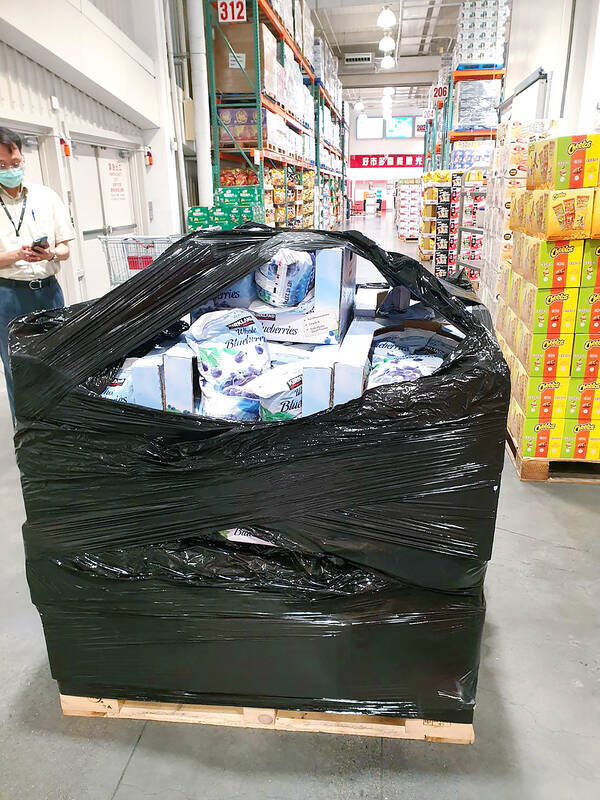Five people who had acute hepatitis A-like symptoms after consuming frozen berries sold at Costco tested negative for the disease, while 32 confirmed acute hepatitis A cases did not eat the potentially contaminated berries, the Ministry of Health and Welfare said yesterday, after it last week announced that it would monitor the hepatitis A situation until the end of next month.
Food and Drug Administration (FDA) Director Wu Shou-mei (吳秀梅) said the hepatitis A virus was detected in a batch of Kirkland Signature Three Berry Blend during a border inspection on April 10, after which the Kaohsiung Department of Health the next day took samples from five other batches of berries sold at Costco, finding that one of them was contaminated.
Starting on April 29, batch-by-batch border inspections were conducted on all frozen berries imported by Costco, she said.

Photo courtesy of Chiayi Department of Health via CNA
A batch of frozen blueberries was found to be contaminated on Monday last week, leading to the suspension of all frozen berry imports by the company on Wednesday last week and all frozen berries sold at its stores being pulled from the shelves on Friday for testing, she said.
The FDA ordered Costco to submit an improvement plan by yesterday, Wu said, adding that the Kaohsiung health department fined the company NT$7.5 million (US$244,069).
Deputy Minister of Health and Welfare Victor Wang (王必勝) said that as the virus was detected in frozen berries imported from different countries, the suspension would remain in place until the company finds the source of the contamination and addresses the issue.
Centers for Disease Control (CDC) Deputy Director-General Philip Lo (羅一鈞) said that since the FDA on April 28 announced that contaminated berries had been found, the CDC was notified about 20 cases of suspected acute hepatitis A, with five people among them having eaten frozen berries bought from Costco in the prior 60 days.
However, the five tested negative, Lo said.
As of Tuesday, 32 local cases of hepatitis A were confirmed, but contact tracing showed that none of them had eaten frozen berries bought from Costco within 60 days, he said, adding that the CDC would continue to monitor the situation.
Lo said that as berries are usually hand-picked, the contamination could originate from an infected berry picker or contaminated water, but the risk of infection from eating the berries is low.
However, the infection risk depends on the viral load on the berries, and the immunity and vaccination status of the person who consumes them, he said.
Most Taiwanese aged 50 or older have contracted hepatitis A during childhood, so they will have immunity, but people aged 40 or younger are less likely to have immunity from infection, he said.
Lo said that people who purchased the berry products should not consume them, but those who already have should not panic.
They should see a doctor if they develop suspected symptoms, such as a fever, general fatigue, loss of appetite, vomiting, abdominal pain or jaundice, within 60 days of eating the berries, he said.
Consumer Protection Office senior consumer ombudsman Wang Te-ming (王德明) said the office asked Costco to draft a compensation plan by today.

US climber Alex Honnold is to attempt to scale Taipei 101 without a rope and harness in a live Netflix special on Jan. 24, the streaming platform announced on Wednesday. Accounting for the time difference, the two-hour broadcast of Honnold’s climb, called Skyscraper Live, is to air on Jan. 23 in the US, Netflix said in a statement. Honnold, 40, was the first person ever to free solo climb the 900m El Capitan rock formation in Yosemite National Park — a feat that was recorded and later made into the 2018 documentary film Free Solo. Netflix previewed Skyscraper Live in October, after videos

Starting on Jan. 1, YouBike riders must have insurance to use the service, and a six-month trial of NT$5 coupons under certain conditions would be implemented to balance bike shortages, a joint statement from transportation departments across Taipei, New Taipei City and Taoyuan announced yesterday. The rental bike system operator said that coupons would be offered to riders to rent bikes from full stations, for riders who take out an electric-assisted bike from a full station, and for riders who return a bike to an empty station. All riders with YouBike accounts are automatically eligible for the program, and each membership account

A classified Pentagon-produced, multiyear assessment — the Overmatch brief — highlighted unreported Chinese capabilities to destroy US military assets and identified US supply chain choke points, painting a disturbing picture of waning US military might, a New York Times editorial published on Monday said. US Secretary of Defense Pete Hegseth’s comments in November last year that “we lose every time” in Pentagon-conducted war games pitting the US against China further highlighted the uncertainty about the US’ capability to intervene in the event of a Chinese invasion of Taiwan. “It shows the Pentagon’s overreliance on expensive, vulnerable weapons as adversaries field cheap, technologically

NUMBERs IMBALANCE: More than 4 million Taiwanese have visited China this year, while only about half a million Chinese have visited here Beijing has yet to respond to Taiwan’s requests for negotiation over matters related to the recovery of cross-strait tourism, the Tourism Administration said yesterday. Taiwan’s tourism authority issued the statement after Chinese-language daily the China Times reported yesterday that the government’s policy of banning group tours to China does not stop Taiwanese from visiting the country. As of October, more than 4.2 million had traveled to China this year, exceeding last year. Beijing estimated the number of Taiwanese tourists in China could reach 4.5 million this year. By contrast, only 500,000 Chinese tourists are expected in Taiwan, the report said. The report